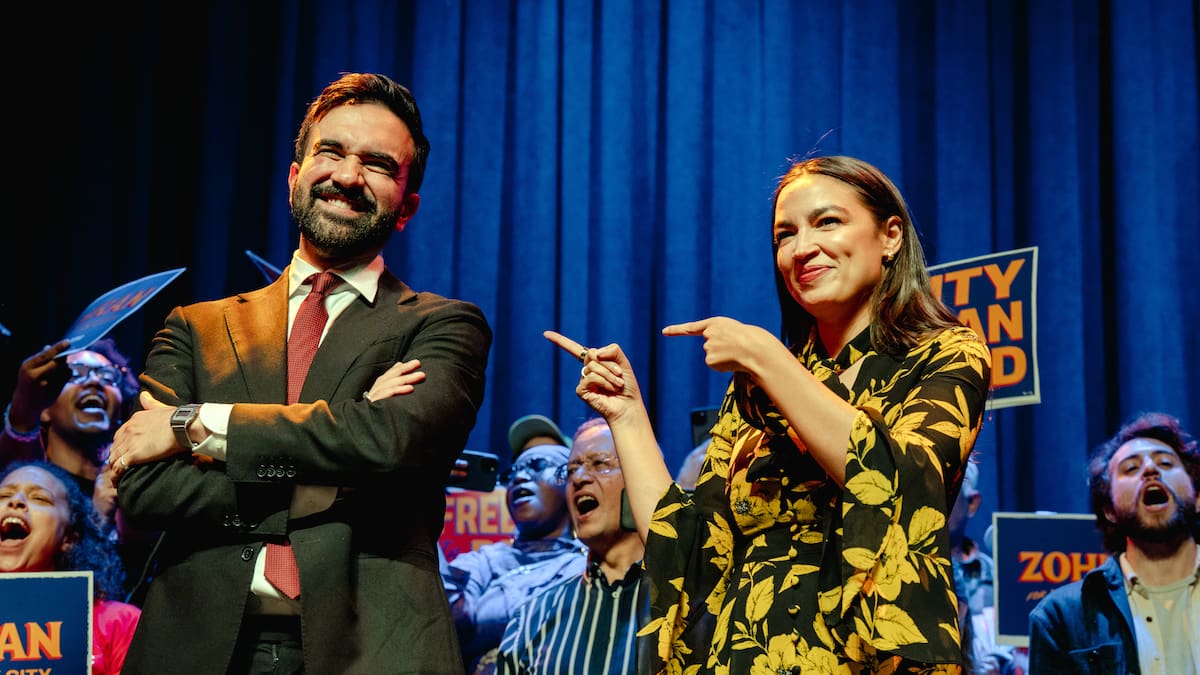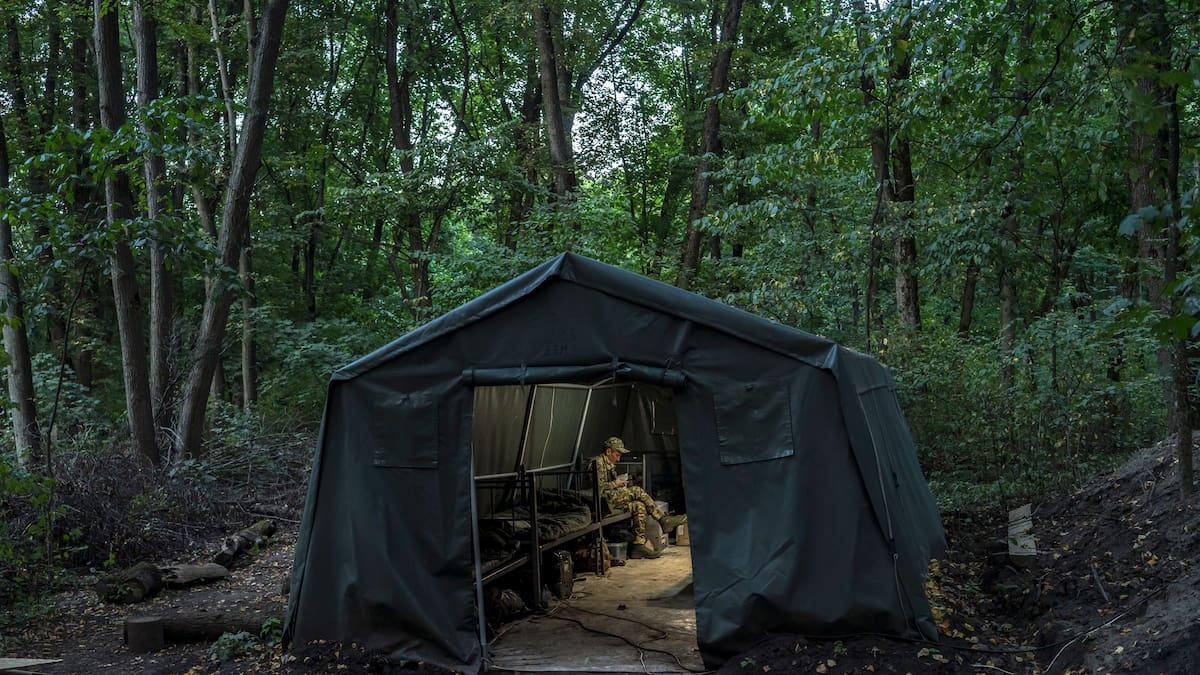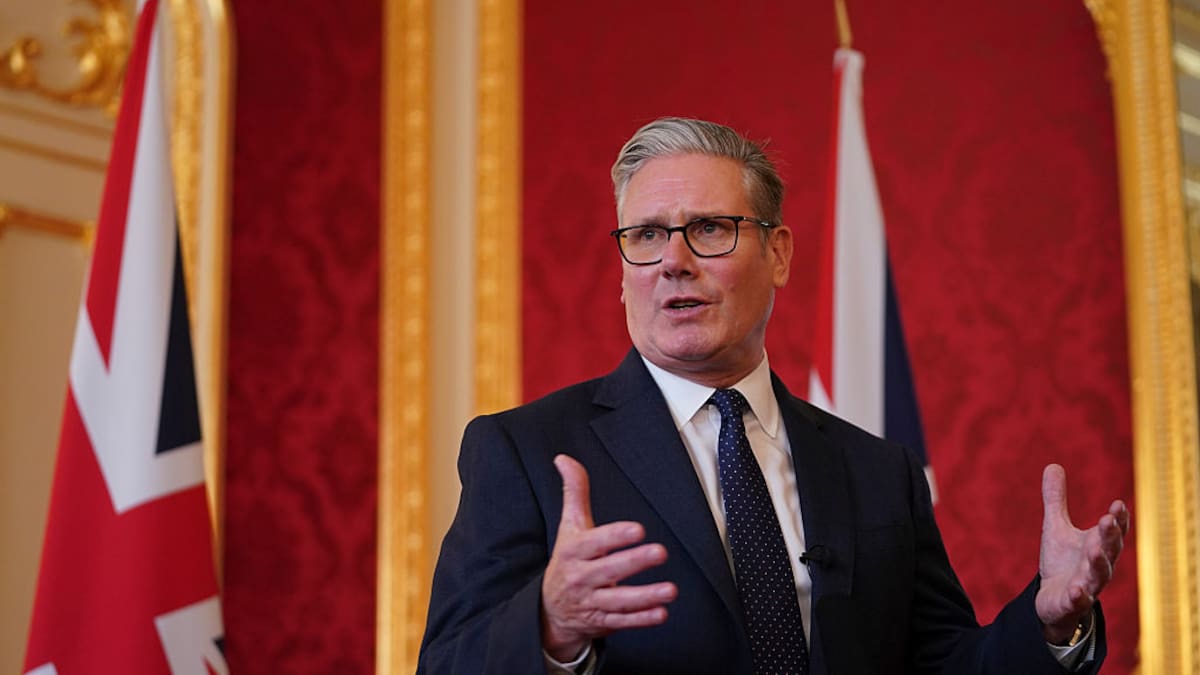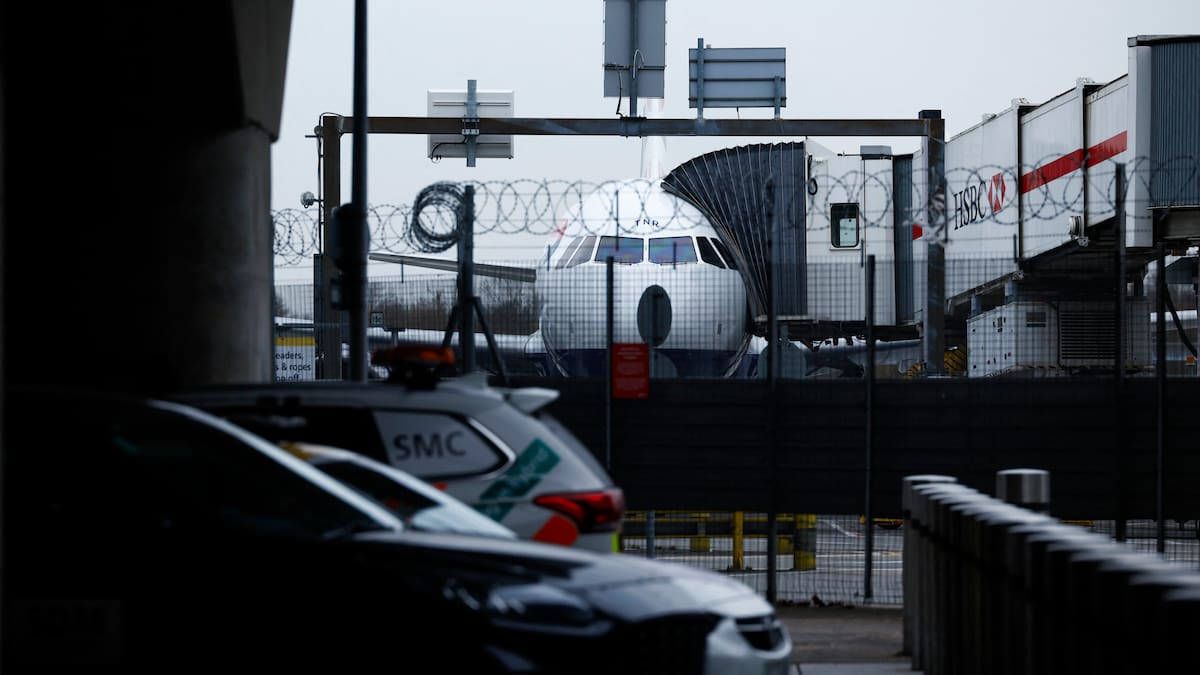In fact, at the time, Ocasio-Cortez was not behind him. And some in her life doubted that Mamdani’s campaign was the right thing to do.
Despite their surface similarities as 30-something democratic socialists with overlapping legislative districts — hers in Congress, his in the state Assembly — their relationship was something between cordial and wary.
Privately, Ocasio-Cortez initially questioned Mamdani’s experience and his viability as a candidate, according to people who spoke with her.
Some allies of hers considered him a Quixote of Queens, a well-intentioned but way-down-ballot legislator drawn to a vanity run.
They feared that a risky left-wing bid for City Hall might undercut the methodical yearslong effort to install democratic socialists in less prominent local offices, diverting activists’ time and money.
But by late spring, with Mamdani’s campaign second in polls and electrifying the left, Ocasio-Cortez made a determination.
Whatever her reservations, Mamdani stood the best chance of defeating former Governor Andrew Cuomo.
With a critical primary debate scheduled for early June, Ocasio-Cortez’s chief of staff was dispatched to play Cuomo in one of Mamdani’s prep sessions.
She would send official word of her endorsement, to Mamdani and then the news media, once the real candidates walked offstage.
“Alex is a tactician,” Representative Nydia Velázquez, an early Mamdani supporter, said of her fellow New York Democrat in an interview. “She knows when is the best moment to strike.”
Now, the political fortunes of America’s pre-eminent young progressives are entwined in a cautious but burgeoning alliance between two former insurgent underdogs who happen to represent the same patch of Queens.
Sensitive to the stakes for both New York’s voters and for her own political and policy aims, Ocasio-Cortez has privately stressed that Mamdani’s performance in office would invariably be viewed as a referendum on progressive politics nationally, enshrining their city as the epicentre and proving ground for a movement.
Ocasio-Cortez is considering a run for either the Senate or the presidency in 2028.
Mamdani’s tenure would represent a real-time test of democratic socialist governance in America on by far the grandest scale to date.
If elected, Ocasio-Cortez has semi-joked, he has no choice but to be a historically excellent mayor.
“We see the fate of the organised left and the Mamdani administration’s fate to be tied together,” said Gustavo Gordillo, a co-chair of the New York City chapter of the Democratic Socialists of America.
“His success would be our success, and his failure would be our failure. I think she is pretty aligned on that.”
The two are aligned on much else, in theory. They are establishment-sceptical, internet-ubiquitous, despised by the right, beloved (usually) by the left and committed to a wildly ambitious political project.
They recognise the relentless headwinds facing a flailing Democratic Party that is desperate to present a compelling alternative to United States President Donald Trump but uncertain (at least outside the pair’s liberal districts) of how far and how fast to push.
At the same time, they are very different people, in biography and in bearing, sounding each other out in an emerging partnership — the man aspiring to lead the nation’s largest city and the woman making room for a new progressive celebrity.
Endorsing Mamdani, 33, in June, Ocasio-Cortez, 35, said pointedly that she had “made my expectations of the Assembly member quite clear” concerning the expertise and support he would need if elected. Mamdani would be the city’s youngest mayor in over a century.
Allies to both interpreted the remark as something of a gentle warning.
Ocasio-Cortez is acutely aware of some voters’ trepidations about sending someone two years her junior to high office. Aides to Ocasio-Cortez and Mamdani declined to make them available for interviews.
But in recent months, advisers insisted, Ocasio-Cortez and Mamdani have grown closer than is widely known.
In person, by phone and in regular text messages, they have held forth for hours about the election strategy and the tumult of sudden-onset fame.
She has encouraged Mamdani to take mental-health walks, people familiar with their conversations said, and has discussed with him the spectre of perpetual death threats.
She has assured him that voters are sophisticated enough to understand the political realities of the election, suggesting that most on the left could abide some gestures towards the centre from a candidate who once called to defund the police and decriminalise prostitution.
Her team has even recommended a throat lozenge brand, Grether’s, passed down to her after Senator Bernie Sanders found it effective, to keep Mamdani’s voice fresh for public appearances — a kind of siblinghood of the travelling progressives.
The young duo’s combined dynamism at a microphone has thrilled and occasionally sobered their supporters, who are more accustomed to challenging power than wielding it.
Cea Weaver, a tenant organiser and DSA member, said she could not escape a nagging pang as Mamdani and Ocasio-Cortez stirred a Manhattan audience together in June: They might actually win this one.
“I was like, ‘Oh no,’” Weaver recalled with a laugh. “‘We’re going to have to run the city.’”
Same circles, different jobs
They are the sorts of politicians whom consultants tactfully call telegenic — and whom even Sanders, who has long disdained style-over-substance punditry, cannot help but appraise on style, at least a little.
“Very good politicians,” he said in a phone interview, days before the three met in Queens during the senator’s visit to New York for an event with Mamdani. “They’re relatable. They know how to get out on the street.”
The paths to prominence for Ocasio-Cortez and Mamdani include some nuanced but significant distinctions.
While both have been caricatured on the right as Champagne socialists, Ocasio-Cortez worked before seeking office in the kinds of service jobs, as a server and bartender, that Mamdani would never need as the son of an esteemed filmmaker and academic.
While Ocasio-Cortez is now a fourth-term member of Congress, Mamdani is seeking to jump several rungs from recently obscure local official to the job often described as the second-most difficult in American politics.

And while both have warm ties to leaders and members of the DSA, especially in New York, Ocasio-Cortez’s recent history with the group has been far knottier.
Some in the national DSA have pushed a censure resolution accusing Ocasio-Cortez of “tacit support of Zionism”, suggesting that she has been too equivocating in her denunciations of Israel.
She is no longer endorsed by the national DSA, though she remains endorsed by its New York City chapter.
Mamdani, by contrast, has often been held up as the DSA gold standard — not merely aligned with the organisation but central to its efforts, steeping himself in its local campaigns.
“He was a lot more in DSA than AOC,” Weaver said, citing Mamdani’s work to support fellow socialists in Albany, the capital of New York. “Zohran is 100% an architect and leader of our socialists-in-office project.”
Their divergent instincts were reflected in the 2024 Democratic presidential primary.
Ocasio-Cortez, who has formed working relationships with some party moderates and Republicans in Washington, vocally backed the Biden-Harris ticket.
Mamdani promoted the “Uncommitted” movement, which withheld primary votes in protest at the Administration’s Middle East policies. Mamdani has said he voted for former Vice-President Kamala Harris in the general election, but he did little to publicly boost her candidacy.
Mamdani, a heedful student of both local and movement politics, has for years watched Ocasio-Cortez’s career with high interest and regard, often up close.
When she toppled Representative Joseph Crowley in June 2018, Mamdani was managing a state Senate campaign that zealously courted (and eventually earned) her endorsement in a primary held months later.
“We talked about her quite a bit,” said Ross Barkan, the state Senate candidate Mamdani was working for and a political writer, who lost the primary.
The next year, both Ocasio-Cortez and Mamdani worked to elect Tiffany Cabán, a democratic socialist, as the Queens district attorney. Cabán’s narrow loss, by fewer than 100 votes, was a harbinger of Ocasio-Cortez’s influence and the organising power of the young left, especially in Queens.
So was her ferocious opposition, just as she was joining Congress, to Amazon’s proposed corporate campus in Long Island City, Queens, after the tech giant negotiated for billions in government incentives. Amid a backlash from Ocasio-Cortez and other elected officials and activists, Amazon cancelled its plans.
“That 2019 year was formative for him — being in Queens, seeing AOC’s success,” Barkan said of Mamdani. “He saw what she was able to do very quickly, just months into her time in office.”
After Mamdani’s election to the Assembly in 2020, Ocasio-Cortez was something between a peer-ish counterpart — with shared constituents but a far more expansive following — and a role model.
Mamdani publicly defended Ocasio-Cortez against criticisms that she spent too little time tending to her district. They both advocated debt relief for taxi drivers.
They did not speak all that often, colleagues said. But she was spoken about often.
“It’s kind of like having a big sister,” said Emily Gallagher, a Brooklyn Assembly member and a fellow democratic socialist, recalling discussions with Mamdani about Ocasio-Cortez during commutes to Albany.
“You just want them to hang out with you, even though they’re your peer and you’re working together. There’s an element of, How do I take this to the next level?”

A very small club
At about 2.30am on a Wednesday in June, parked on an empty Queens block, Mamdani and Ocasio-Cortez sat alone in a blue SUV, dumbstruck and processing.
His life was about to change after a primary mega-upset that was already reverberating well beyond the boroughs. She knew something about that.
As election night turned to post-election-early-morning, Ocasio-Cortez had hustled north from Washington after the results had become clear.
She arrived in time to hug the candidate beneath the streetlight of a deserted intersection, far enough from his victory party that no one would crowd them.
They settled into the back seat for an impromptu summit — about what just happened, about what was coming.
“It felt surreal as it was happening,” Morris Katz, a top Mamdani adviser, said of the scene.
“What used to be backroom deals in C-suites to decide what the future of our city would look like is now AOC and Zohran in Long Island City at 3am.”
Since then, people who know her said, Ocasio-Cortez has embraced her role as a sounding board.
Mamdani, aides noted, is experiencing the kind of personal and political upheaval that she understands as almost no one else can.
“Sometimes it’s just nice to talk to someone else,” Katz said.
As Ocasio-Cortez has privately preached the importance of a broad appeal in the pivot to a general election, Mamdani’s supporters have largely (though not universally) allowed him room to manoeuvre.
A would-be mayor who has said he does not believe there should be billionaires has met billionaire former mayor Michael Bloomberg, among other business leaders.
He has distanced his campaign from some elements of the national Democratic Socialists of America platform, with relatively little pushback from influential members of his base.
“Maybe they’re actually maturing,” former Mayor Bill de Blasio, a Mamdani supporter, said of the organised left in an interview.
“It’s almost like everyone on cue has known to chill.”

Some of Ocasio-Cortez’s allies have asked privately why she has not always been afforded the same deference.
Several see more than a hint of misogyny in the relative treatment of Ocasio-Cortez and Mamdani in some corners of the left.
Last year, protesters confronted her at a movie theatre to demand that she use the word “genocide” to describe Israel’s wartime actions.
Two months ago, amid a deluge of death threats, her campaign office in the Bronx was vandalised with an anti-Israel message.
Ocasio-Cortez has consistently condemned Israel, called Prime Minister Benjamin Netanyahu a “war criminal” and, since March 2024, used the word “genocide” to describe the nation’s conduct.
In her public role as a surrogate for Mamdani, Ocasio-Cortez urged mainstream Democratic holdouts to get in line.
That list has included the Democratic leaders of each congressional chamber, who are both New Yorkers: Senator Chuck Schumer and Representative Hakeem Jeffries.
“I am very concerned about the example that is being set,” Ocasio-Cortez told reporters recently.
“If an individual doesn’t want to support the party’s nominee now, it complicates their ability to ask voters to support any nominee later.”
Earlier in the northern summer, Ocasio-Cortez shepherded Mamdani around Washington for a goodwill meet-and-greet, introducing him to lawmakers stunned at his victory and discussing lessons from his primary.
Publicly and privately, some Democrats had made it clear that they were not yet sold on him.
She knew something about that.
“Get to know him, you know?” Ocasio-Cortez said outside the Capitol, addressing those reluctant to come around.
“If anybody is sceptical, I would say get to know him.”
This article originally appeared in The New York Times.
Written by: Matt Flegenheimer
Photographs by: Shuran Huang, Haiyun Jiang, Victor J. Blue, Sarah Blesener
©2025 THE NEW YORK TIMES






